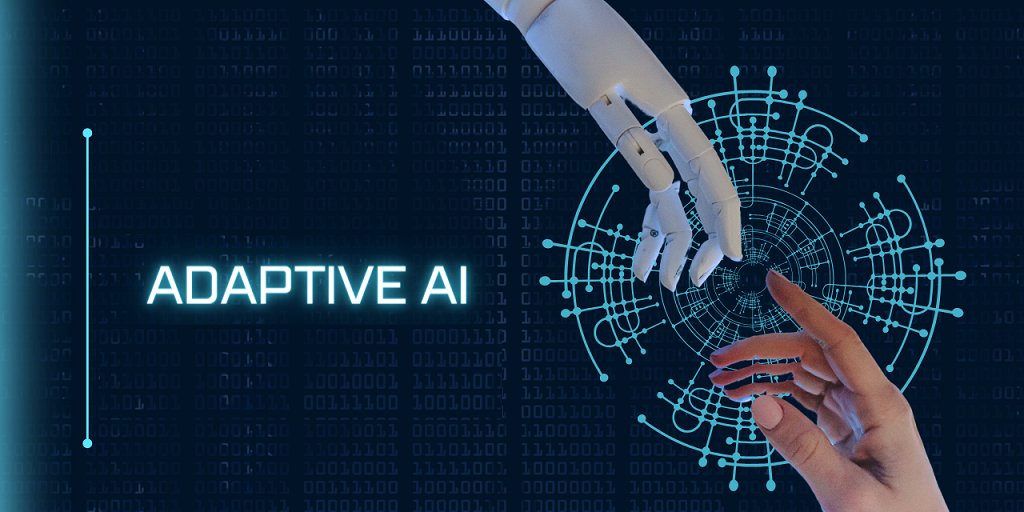Adaptive AI: An Overview
In artificial intelligence, Adaptive AI is at the top, attempting to build systems that can adapt and evolve in response to new data and environmental changes. Adaptive AI has given flexibility, that allows the systems to adapt their behavior in response to new information or environmental changes.
Technological Foundations and Methods
Adaptive AI is based on a wide range of algorithms and methods due to which the machines can learn from prior experiences, spot patterns, and can also make informed predictions. Machine learning, neural networks, reinforcement learning, and evolutionary algorithms are a few of the methods available.
Significance of Adaptive AI in the Modern Era
We cannot underestimate the significant role of adaptive AI in today's world. As data output by individuals and organizations increases, the demand for sophisticated systems that are able to carry out deep analysis grows, which has made adaptive AI a vital participant in a variety of industries.
Adaptive AI shines in customizing user experiences and is equally vital for enhancing business operations and customer interaction. By processing user behavior and preferences, adaptive AI systems offer tailored recommendations and content, enhancing each user's experience.
Core Adaptive AI Strategies in Digital Corporations
Digital corporations use adaptive AI to make informed decisions based on current data and user interactions. Essential strategies include:
- Machine Learning: It employs pattern recognition, predictive analytics, and user interaction enhancement techniques. This can be seen in a lot of systems like recommendation engines, fraud detection mechanisms, and automated customer support.
- Natural Language Processing (NLP): Allows the comprehension and processing of human language. This technology is instrumental in developing smart chatbots, virtual assistants, and tools for sentiment analysis.
- Predictive Analytics: It leverages the data mining and statistical models to forecast future occurrences. This technique has been proven very important for businesses to understand market tendencies, consumer behavior, and refine their marketing strategies.
- Personalization: It customizes content and suggestions to satisfy what the customer prefers, thus improving the user experience, especially in online retail situations.
- Adaptive Testing: Modifies the level of test difficulty in response to a user's performance. This approach enhances learning results and offers customized feedback, making it a staple in digital educational platforms.
By integrating adaptive AI, companies are empowered to make decisions grounded in data, enrich user experiences, and secure a leading position in the ever-evolving digital market landscape.
Applications Across Industries
Adaptive AI's adaptability spans various sectors, offering tailored solutions and optimizing operations. Prominent applications include:
- Healthcare: Provides personalized patient care by analyzing real-time data for predictive diagnostics and customized treatment planning.
- Finance: Improves investment strategies and risk management through market analysis and fraud detection.
- Education: Personalizes learning experiences by evaluating student performance and offering adaptive learning resources and feedback.
- Transportation: Optimizes traffic management and public transit by processing and reacting to real-time traffic data.
- Manufacturing: Increases production efficiency and minimizes waste through data analysis and process optimization.
Advantages of Adaptive AI
Embracing adaptive AI offers numerous benefits, such as:
- Customized Experiences: Delivers personalized experiences, increasing user involvement and satisfaction.
- Enhanced User Experience: Predicts user needs, providing pertinent suggestions and a fluid interaction.
- Superior Customer Service: Automates and personalizes customer interactions, streamlining service provision.
- Efficiency in Operations: Automates routine tasks, enhancing productivity and reducing operational expenses.
- Strategic Decision-Making: Offers valuable insights into user preferences and behavior, aiding in business strategy formation.
The Prospect of Adaptive AI
Adaptive AI is set to redefine numerous industries by enhancing decision-making processes and handling complex tasks. This transformative potential, coupled with a commitment to ethical AI practices, marks a period of significant advancements.
Concluding Remarks
Adaptive AI is a dynamic and evolving field within AI, poised to handle complicated issues and refine decision-making across multiple sectors. Navigating the ethical and societal repercussions of these breakthroughs is critical.
Enhancing AI Testing for Enterprises
QA Genesis establishes itself as a leading software testing provider, globally recognized for its comprehensive testing services across industries. Our methodology guarantees optimal performance of AI systems, positioning businesses at the forefront of innovation.
Our Distinct AI Testing Services
Our testing spans extensive aspects of AI systems, ensuring thorough performance assessments. We provide adaptive testing to align with evolving AI systems, supported by an experienced team and advanced tools. Our services encompass data quality, algorithmic, integration, and performance testing, ensuring your AI systems operate at their best.
